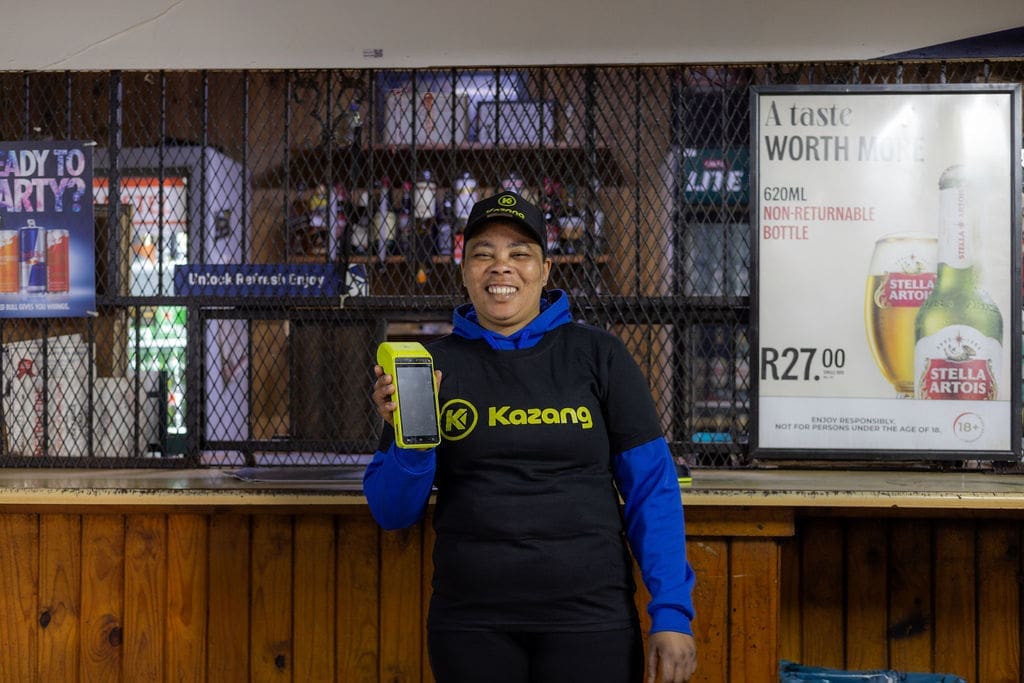In the heart of South Africa’s townships, a quiet revolution is brewing. The nation’s tavern sector, worth an estimated R40 billion to R60 billion a year and comprising more than 34,000 licensed tavern owners, is finally going digital.
For decades, these vital community hubs have operated on a basis of cash and manual record-keeping.
But now, fintech solutions are sweeping in, transforming these cash-only businesses into digitally-enabled engines of growth.
Bridging the Digital Divide
The scale of the opportunity is massive.
“Taverns play a central role in township life, offering social hubs to the community and creating hundreds of thousands of jobs,” says Jonathan Thomson, Executive Head: Commercial at Kazang.
“Yet most of these businesses remain cash-driven and reliant on informal processes and systems. Modern technologies offer tavern owners opportunities to increase their profitability.”
Fintech companies are leading this charge by placing affordable, subsidised point-of-sale (POS) devices into the hands of tavern owners. But these are more than just digital cash registers, they are a gateway to a formalised economy.
More Than a Cash Register: The POS as a Powerhouse
Kazang, for instance, has equipped over 10,000 licensed taverns with these multi-functional devices. Each terminal is a business-in-a-box, featuring a scanner, cash drawer, and the ability to accept card payments and sell prepaid services like airtime.
The impact is immediate and multifaceted:
-
Fighting Crime & Streamlining Cashflow:
“Card acceptance is fully integrated with the POS system. Customers tap their cards and the sale is processed in a matter of seconds,” explains Thomson. This directly reduces the risks of cash crime. Furthermore, funds from card sales are settled directly into a digital wallet, which owners can use to pay suppliers electronically, creating a safer, more efficient financial loop.
-
Smarter Stock Management: The POS systems feature integrated inventory management, tracking stock in real-time. This allows owners to optimize prices, prevent shortages, and make data-driven purchasing decisions, directly tackling the challenge of low margins.
The Key to Unlocking Capital: A Digital Footprint
Perhaps the most transformative aspect is the creation of a verifiable financial history.
“One of the biggest advantages of such a system is that it provides an electronic record of transactions, putting tavern owners on a pathway to formalising their businesses,” says Thomson. “They can, for example, start to tap into financing for working capital and business expansion.”
This is not a theoretical benefit. Through solutions like Kazang Capital, developed with TymeBank, tavern owners can now receive pre-approved advances based on the digital records from their POS devices. This solves a critical pain point.
“Many merchants would like to add a pool table to their offering, stock up when suppliers are offering deeper discounts, or invest in additional refrigeration, but don’t have the funds,” Thomson notes. “But more accessible capital can enable them to improve their customer offer and grow their business.”
Building a Fintech Ecosystem for the Future
The end goal is a complete business solution. “By combining tools for payments, supplier management, inventory tracking and access to working capital into one solution, we are helping to build a full fintech ecosystem for taverns,” Thomson adds.
This digital transformation is about more than just convenience. It’s about resilience, growth, and inclusion. As South Africa’s taverns embrace this tech-driven future, they are not only securing their own prosperity but also powering the broader township economy forward, one digital transaction at a time.
